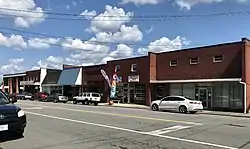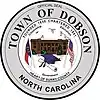Dobson, North Carolina
Dobson is a town in Dobson Township, Surry County, North Carolina, United States. As of the 2020 census,[4] the town population was 1,396. It is the county seat of Surry County.[5] Dobson is the home of the Shelton Vineyards, the largest winery in North Carolina. It is also home to a significant Latino population due to the large number of farms in the area. The main crops in the area are corn, tobacco and soy beans.
Dobson, North Carolina | |
|---|---|
 West Atkins Street | |
 Seal | |
 Location of Dobson, North Carolina | |
| Coordinates: 36°23′34″N 80°43′28″W | |
| Country | United States |
| State | North Carolina |
| County | Surry |
| Government | |
| • Type | Local/Municipal |
| • Mayor | Ricky Draughn |
| • Town Manager | Laura Neely |
| Area | |
| • Total | 2.04 sq mi (5.29 km2) |
| • Land | 2.03 sq mi (5.26 km2) |
| • Water | 0.01 sq mi (0.03 km2) |
| Elevation | 1,230 ft (370 m) |
| Population (2020) | |
| • Total | 1,462 |
| • Density | 719.84/sq mi (277.97/km2) |
| Time zone | UTC-5 (Eastern (EST)) |
| • Summer (DST) | UTC-4 (EDT) |
| ZIP code | 27017 |
| Area code | 336 |
| FIPS code | 37-17340[3] |
| GNIS feature ID | 2406382[2] |
| Website | www.dobson-nc.com |
History
Dobson was established as the county seat in 1853, replacing Rockford after all land in Surry County south of the Yadkin River was used to form Yadkin County.
The Edwards-Franklin House and Surry County Courthouse are listed on the National Register of Historic Places.[6]
Geography
According to the United States Census Bureau, the town has a total area of 1.8 square miles (4.7 km2), all land.
Demographics
| Census | Pop. | Note | %± |
|---|---|---|---|
| 1900 | 327 | — | |
| 1910 | 360 | 10.1% | |
| 1920 | 368 | 2.2% | |
| 1930 | 446 | 21.2% | |
| 1940 | 520 | 16.6% | |
| 1950 | 609 | 17.1% | |
| 1960 | 684 | 12.3% | |
| 1970 | 933 | 36.4% | |
| 1980 | 1,222 | 31.0% | |
| 1990 | 1,195 | −2.2% | |
| 2000 | 1,457 | 21.9% | |
| 2010 | 1,586 | 8.9% | |
| 2020 | 1,396 | −12.0% | |
| 2021 (est.) | 1,390 | [4] | −0.4% |
| U.S. Decennial Census[7][8] | |||
2020 census
| Race | Number | Percentage |
|---|---|---|
| White (non-Hispanic) | 1,062 | 72.64% |
| Black or African American (non-Hispanic) | 64 | 4.38% |
| Native American | 9 | 0.62% |
| Asian | 30 | 2.05% |
| Other/Mixed | 40 | 2.74% |
| Hispanic or Latino | 257 | 17.58% |
As of the 2020 United States census, there were 1,462 people, 657 households, and 327 families residing in the town.
2000 census
As of the census[3] of 2000, there were 1,457 people, 555 households, and 339 families living in the town. The population density was 813.8 inhabitants per square mile (314.2/km2). There were 594 housing units at an average density of 331.8 per square mile (128.1/km2). The racial makeup of the town was 75.84% White, 3.91% African American, 0.41% Native American, 19.42% from other races, and 0.41% from two or more races. Hispanic or Latino of any race were 25.81% of the population.
There were 555 households, out of which 29.2% had children under the age of 18 living with them, 45.6% were married couples living together, 9.4% had a female householder with no husband present, and 38.9% were non-families. 33.7% of all households were made up of individuals, and 18.4% had someone living alone who was 65 years of age or older. The average household size was 2.37 and the average family size was 3.03.
In the town, the population was spread out, with 23.0% under the age of 18, 11.9% from 18 to 24, 29.0% from 25 to 44, 18.9% from 45 to 64, and 17.2% who were 65 years of age or older. The median age was 35 years. For every 100 females, there were 108.1 males. For every 100 females age 18 and over, there were 100.0 males.
The median income for a household in the town was $26,765, and the median income for a family was $34,792. Males had a median income of $22,050 versus $21,000 for females. The per capita income for the town was $19,346. About 17.8% of families and 23.3% of the population were below the poverty line, including 28.6% of those under age 18 and 22.9% of those age 65 or over.
Notable people
- Caleb V. Haynes, United States Air Force major general, air pioneer
- Tabitha Ann Holton, became the first licensed female lawyer in the Southern United States in 1878. She practiced law in Dobson from 1878 to 1886.[10]
- Roy H. Park, broadcaster and publisher
See also
References
- "ArcGIS REST Services Directory". United States Census Bureau. Retrieved September 20, 2022.
- U.S. Geological Survey Geographic Names Information System: Dobson, North Carolina
- "U.S. Census website". United States Census Bureau. Retrieved January 31, 2008.
- "City and Town Population Totals: 2020-2021". Census.gov. US Census Bureau. Retrieved July 9, 2022.
- "Find a County". National Association of Counties. Archived from the original on May 31, 2011. Retrieved June 7, 2011.
- "National Register Information System". National Register of Historic Places. National Park Service. July 9, 2010.
- "Census of Population and Housing". Census.gov. Retrieved June 4, 2015.
- "Census of Population and Housing". Census.gov. Retrieved June 4, 2016.
- "Explore Census Data". data.census.gov. Retrieved December 21, 2021.
- "Archived copy" (PDF). Archived from the original (PDF) on April 23, 2007. Retrieved May 2, 2007.
{{cite web}}: CS1 maint: archived copy as title (link)
